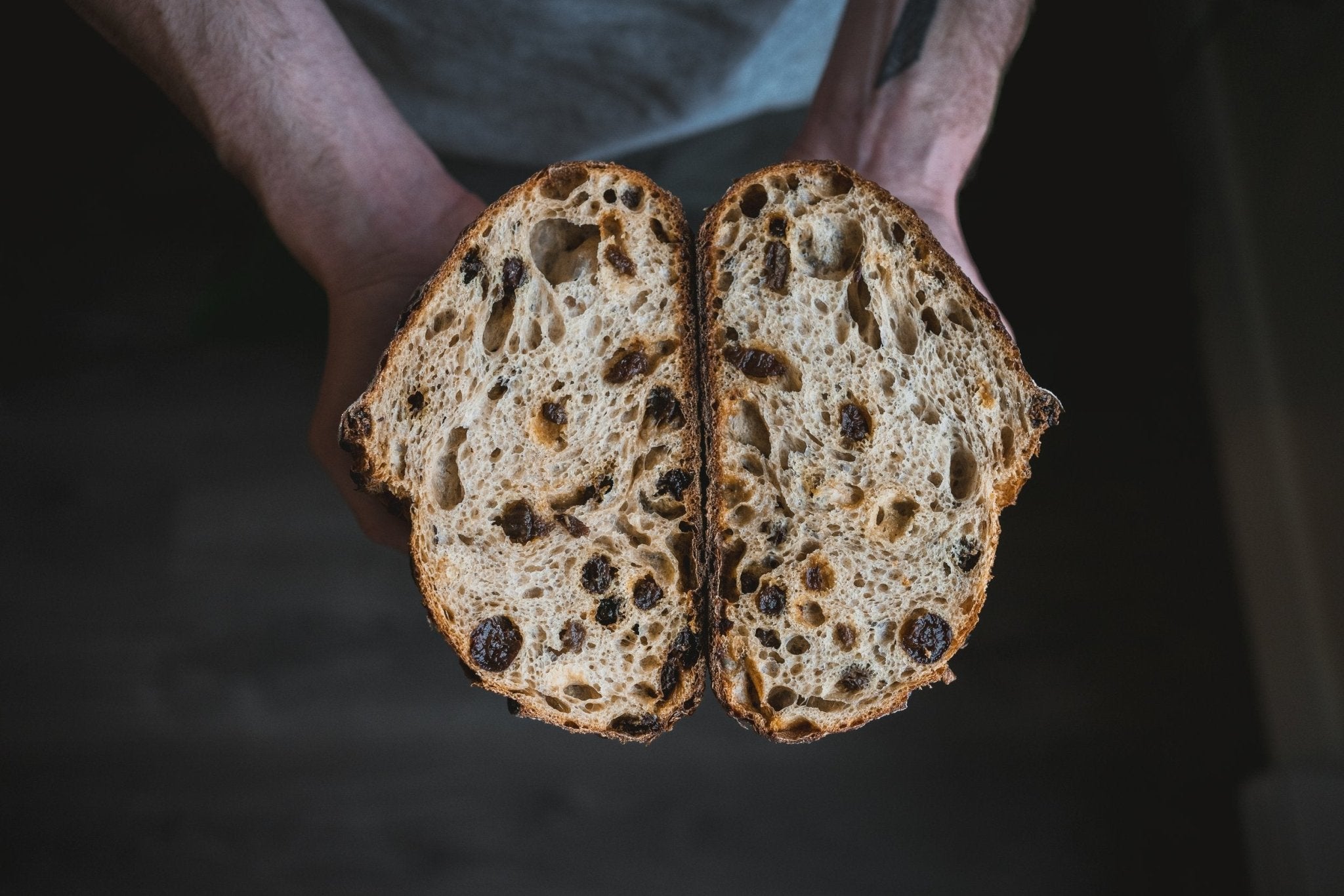
CINNAMON RAISIN SOURDOUGH
Tags:
This is the ultimate cinnamon raisin bread with plenty of plump juicy raisins which have been soaked in rum, vanilla beans and cinnamon. Cinnamon slows down the action of the yeast so this recipe calls for the addition of a very small amount of baker’s yeast to balance out the rising time and prevent the dough from becoming overly acidic. Refer to our sourdough guide if you need more information on the specific techniques used in the method.
CINNAMON RAISIN SOURDOUGH Recipe
Cook time: 30-40 Minutes
Servings:
2 Loaves
Ingredients
FOR THE LEVAIN
- 175g Anita’s Organic All Purpose Flour
- 175g water, room temperature
- 15g mature sourdough culture
FOR THE RAISINS
- 250g raisins
- 5g cinnamon
- 60g (¼ cup) dark rum
- 50g malt syrup
- Scraped seeds of two vanilla beans,
or 3 teaspoons of vanilla extract
FOR THE FINAL DOUGH
- 650g Anita’s Organic All Purpose Flour
- 50g Anita’s Organic Whole Grain Rye Flour
- 3g instant yeast (¾ teaspoon)
- 17g fine sea salt
- 480g water, warm room temperature (26-28C
Instructions
- The evening before baking the bread mix the levain ingredients and let stand at room temperature for 8-12 hours. Look for a 50-75% increase in volume. When ready, it should have a fruity tangy smell and taste.
- Soak the raisins in the rum and malt syrup with the vanilla seeds overnight as well.
- Combine the ingredients of the final dough, minus the yeast and salt, with all of the levain. Mix until fully incorporated and let rest for 30 minutes.
- Sprinkle the salt and yeast on top of the dough and mix by hand until well incorporated.
- Use the ‘slap and fold’ technique to develop the gluten in the dough for 3-4 minutes. If you are unfamiliar with this technique refer to our sourdough guide on the website.
- Allow the dough to rest for 5 minutes.
- Add the raisin mixture to the dough and mix roughly into the dough. The raisins will be further incorporated through the subsequent folds so full incorporation is not necessary at this point.
- Ferment for 3-4 hours at warm room temperature (23-25˚C) with two folds at 45 and 90 minutes or three folds at 30, 60 and 90 minutes if the dough is feeling very loose. The dough should increase in volume around 75% over this time.
- Divide the dough into two 900 g pieces and preshape into a light ball.
- Allow the dough to rest and relax on the counter for 20 minutes.
- Shape the loaf into either a Boule or Batard depending on the shape of your proofing basket, dust with rice flour and place into your proofing basket. A bowl lined with a tea towel will also work if you don’t have a proofing basket. The loaves can also be baked in two 2lb 9”x5” loaf pans.
- Preheat the oven to 475F with a cast iron dutch oven inside for at least 45 minutes. Placing the dutch oven on top of a pizza stone will prevent the bottom from getting too dark. See the sourdough guide for other baking methods.
- Proof 2-3 hours at warm room temperature until the loaf has increased approximately 75% in volume. You can also proof the loaf for one hour at room temperature and then overnight in the fridge. Test if the loaf is ready to bake by lightly pressing the floured pad of your finger into the loaf. If the loaf springs back slowly and not quite all the way back, it is ready to bake.
- Turn the dough out onto a piece of parchment, score with a razor and place in the preheated dutch oven with the lid on. Reduce the oven temperature to 450˚F. Remove the lid after 20 minutes and continue baking 10-20 minutes until deep brown. A fully cooked loaf will have an internal temperature of 210˚F.
- Cool on a wire rack.
In This Recipe
About The Author
Anita's Organic Mill
Anita's Organic Mill is a Canadian based organic mill specializing in high quality always organic flours, grains and cereals. Anita's believes that baking has the power to disconnect us from the hustle, and reconnect us with one another.




